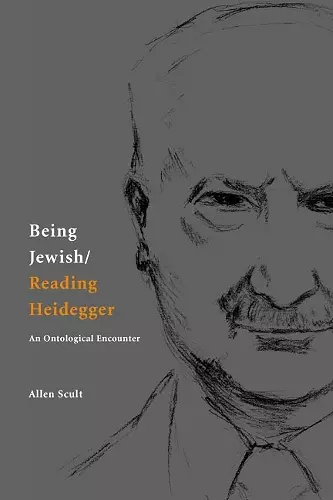Being Jewish/Reading Heidegger
An Ontological Encounter
Format:Hardback
Publisher:Fordham University Press
Published:15th Jul '04
Currently unavailable, and unfortunately no date known when it will be back

This innovative book investigates "being Jewish” not as a sectarian religiosity but as a way of being-in-the-world particularly suited to understanding Heidegger's early phenomenology. At its core is an intimate engagement with “sacred texts,” which grounds “being Jewish” in a way of life constituted as a way of reading—a way of reading transmitted to succeeding generations as a passionate teaching.
Allen Scult argues that Heidegger was similarly involved in a passionate attempt to introduce his students to philosophical practice through a personal engagement with the words of Aristotle. Scult traces the hermeneutical affinity— even intimacy—between Judaism as a way of life, grounded in an intense interpretive relationship to the Torah; and Heidegger's view of philosophical practice, as a similarly intense interpretive relationship to the founding texts of Western philosophy.
In tracing the dynamics of this relationship in Heideggerian and Jewish hermeneutics, Scult not only finds mutually enlightening points of contact between the two, but also uncovers new ways of understanding how Heidegger’s fundamental ontology is grounded in the lived experience of religion.
Allen Scult is National Endowment for the Humanities Professor of Philosophy and Rhetoric at Drake University. He is co-author of Rhetoric and Biblical Interpretation.
Being Jewish/Reading Heidegger ponders what it means to read Heidegger on his own terms, that is, to read him from the place where one is, in Heidegger’s language, in and from the facticity of one’s own Being... To be Jewish, according to Scult, is to be entexted with Torah. Scult argues that this notion of binding one’s being with a textual tradition underlies Heidegger’s theory of Dasein. He uses Heidegger’s lectures on Aristotle’s Rhetoric to illustrate how Heidegger ‘reads Aristotle’ and, in doing so. . . teach[es] the Jew how to be-Jewish-in-the-world through an engagement with a textual tradition (Torah). .Shaul Magid, The Jewish Theological Seminary of America
“a compelling account of how being-Jewish enacts the sort of concrete, revealing relationship to a text and a world that makes meditation on being, as Heidegger - early and late - understands it, possible. Only someone with Allen Scult's trained ear for the subtle interplay of rhetoric and hermeneutics could make us see the remarkable parallels between the Rabbis' reading of...
"Allen Scult proposes to read Heidegger not as a mystagogic seer presuming to echo the very voice of Being but as a kind of Rabbinic sage who carefully reads the classic texts of Greek philosophy in order to make its most basic words speak again to us postmoderns in all their elemental force, just as the long line of rabbis read--study and teach--the classic text grounding Jewish tradition, the Torah, patiently waiting for the primeval words spoken at Sinai to speak again with the same divine force to new generations of Jews recalling their ancient roots and identity. This unabashed return to our recoupled 'JewGreek' origins, flying in the face of postmod fashions, is sprinkled with other unorthodoxies... Scult waxes eloquent especially about what it means to be and to become Jewish--say, by reading Heidegger!--and is absolutely brilliant in his rhetorical return." -- -Theodore Kisiel Northern Illinois University "A compelling account of how being-Jewish enacts the sort of concrete, revealing relationship to a text and a world that makes meditation on being, as Heidegger-early and late-understands it, possible. Only someone with Allen Scult's trained ear for the subtle interplay of rhetoric and hermeneutics could make us see the remarkable parallels between the Rabbis' reading of the Torah and Heidegger's reading of Aristotle... He makes a trenchant case for "a reading of Heidegger not as prophet, but as Rabbinic sage'." -- -Daniel O. Dahlstrom Boston University
ISBN: 9780823223114
Dimensions: unknown
Weight: unknown
186 pages